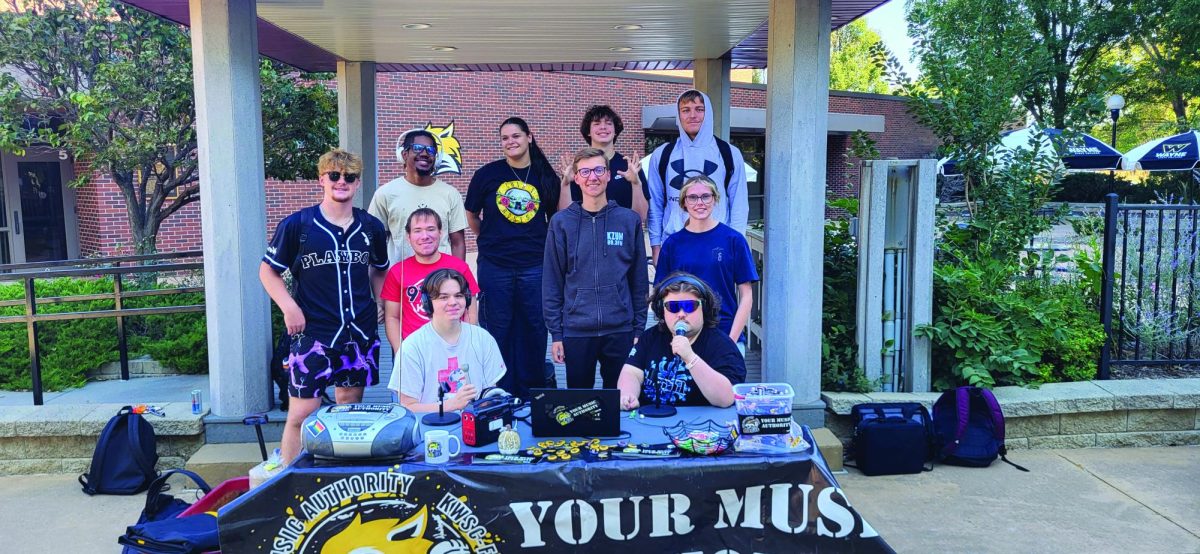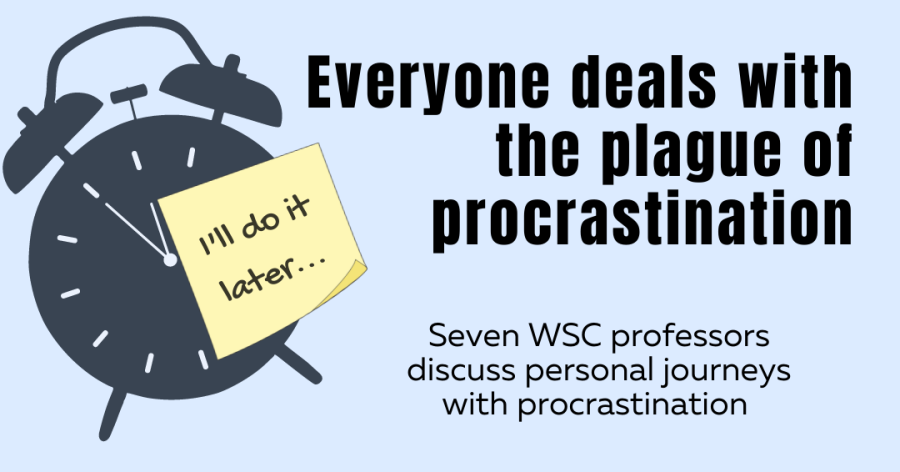Everyone deals with the plague of procrastination
Seven WSC professors discuss personal journeys with procrastination
How do WSC professors deal with procrastination, and does it influence how they respond to student procrastination?
February 17, 2022
Procrastination is something that almost everyone can relate to. Students can often find themselves falling victim to the consequences of procrastination in their classes. But on the other hand, how do the professors here at Wayne State College deal with procrastination, and does it influence how they respond to student procrastination? Is there a double standard in place for some professors or are their actions a reflection of their own struggles with procrastination and the understanding of a struggle that plagues humanity disproportionately?
Procrastination is something that everyone experiences differently. In this article, seven professors talk about their own personal experience with procrastination, how they deal with it, if their own struggles affect how they respond to students who have issues with procrastination and how procrastination affects people differently based on different mental health.
“I have a lot of things on my plate,” Christina Coffman, a graduate student in the Language and Literature Department, said. “In my professional life, what I procrastinate on has more to do with making sure I get my basic needs taken care of. Making sure I eat and drink water. Because there is so much going on and so much to take care of, those things slip my mind. When you become a professional, those basic needs get pushed aside because there are so many different things to take care of.”
Coffman continued with how important it is to stay organized to avoid procrastination. She pushes all her students to adopt an organization plan into their college life. Having something that you can see every day as a reminder of work that needs to be done is a good way to keep on track, for this purpose, Coffman recommends phone apps as something that can help students.
When it comes to a work life balance, scheduling and organization are her methods that allow her to focus on life outside of work.
“I quite literally slot out time for myself,” Coffman said. “I make a rule for myself: I don’t do any work after 7pm. I want to have the rest of my night to unwind, catch up with my family or friends, or watch Netflix. So, between the hours of 7 and 9pm is my free time. I don’t think about anything. My brain turns off and I am probably on TikTok the entire time.”
Coffman also explains how this can be an example of rewarding yourself for working well. She also warns about how this method can be dangerous when used for short periods of time. How a quick twenty-minute break turns into thirty, and lunch, and eventually you might lose track of schedule.
Prioritizing what you need to get done so you can spend the time you need for what keeps you going, she explained. With this balance, success is just on the horizon.
When asked if professors feel responsible to remind students of their assignments, Philip Fox of the History, Politics and Geography Department, says it is not his responsibility, but helping isn’t always a heavy burden.
“I want to see students succeed,” Fox said. “A little bit of encouragement or a few reminders can go a long way toward helping them with a relatively light burden on me.”
He explains that going through college as a young adult is a process where the student matures. A student at the end of their time here will be able to work more independently than they could when they arrived as a freshman.
Fox has a kind response when it comes to procrastination when students communicate with him. But what influences his response are his own experiences of procrastination.
“I feel the pull of procrastination,” Fox said. “As my roommate in college put it: procrastination always pays off now. That is the psychological problem with it. To put aside what you don’t want to do and do something you would rather do always feels better in the moment.”
Fox recommends the separation of your work from what you would rather be doing to help with procrastination.
“I did a lot of writing in libraries or coffee shops,” Fox said. “I would go to a space where a lot of potential distractions weren’t there to try and help me focus. Staying in my dorm room didn’t work.”
Other professors have different ways to avoid procrastination, and all the professors interviewed had different tactics.
“You have to keep the ball in front of you,” Randy Bertolas said. “Never let the ball get behind you. Everything that comes my way, and every day I take in a hundred emails plus text messages plus people walk in the door, you have to keep everything in front of you. And the best way to keep from procrastinating is to let them build up here. And then they start to annoy you. Because you can’t do anything on here. And then one day, you just start harvesting. And all that procrastination built up energy came out. I was just knocking my thighs down, making phone calls, typing emails, putting stuff in the mail. And look, I got it down to this one little one. They are always looking at me. They are always in front of me. Never let any get behind you.”
Teresa Morales, an assistant professor of communication arts, simply says everyone experiences procrastination.
“Ah, procrastination,” Morales said. “Anyone who says they don’t is probably lying.”
Even with the consensus, there are some professors who feel as though they do not procrastinate.
“Procrastination is something that I have never experienced,” Lidice Aleman, an associate professor of the Language and Literature Department, said. “Also, if my students do suffer from it, they don’t talk with me about it. My evaluations have due day and I do not accept late work. In short, I cannot tell whether they procrastinate themselves or not.”
Zach Drees, an assistant professor in the Language and Literature Department, says that procrastination is impossible to avoid, but can be managed. Drees follows the writings of Paul Graham’s “Good and Bad Procrastination”
“Most people who write about procrastination write about how to cure it,” Graham said. “But this is, strictly speaking, impossible. There are an infinite number of things you could be doing. No matter what you work on, you’re not working on everything else. So, the question is not how to avoid procrastination, but how to procrastinate well.”
Drees explains how procrastination that works for you can be something like doing the dishes instead of your higher priority work. It still prevents you from doing your actual work, but it allows for you to get important things done. Everyone must do dishes, everyone needs to do laundry, and these things can be done as a break from the prioritized work, he explains.
When it comes to students, Drees is lenient. He predominantly teaches the youngest students at Wayne, where they might need a little more help than the students who have been here for longer. Like the idea Fox explains.
“There can be a lot of different reasons for procrastination,” Alicia Dorcey McIntosh, the director of Student Health and Counseling. “Sometimes it’s depression, sometimes it’s anxiety sometimes it’s ADHD and sometimes it’s good old procrastination.” With the average age of college students, in their early twenties, mental health issues start to appear in some students. When you are in college you have things that you have to do that you may not like that you have to do for class, and it can pile up, explains Mclntosh.
“Sometimes I think procrastination is your brain telling you that you need a rest,” McIntosh said. “And I think it is important to acknowledge that when it’s true. Not necessarily playing video games or checking your phone but doing things that allow rest.”
Overall, every professor deals with procrastination differently, and recommends different ways to avoid it, or manage it. Almost every professor interviewed had amazing insight into how to avoid procrastination, and all seemed ecstatic to give them to a student.
As students make their way through college, it could be said the best way to help yourself is to ask a question. Procrastination is something that almost everyone experiences and asking for help and communicating can give you what you need to succeed.










